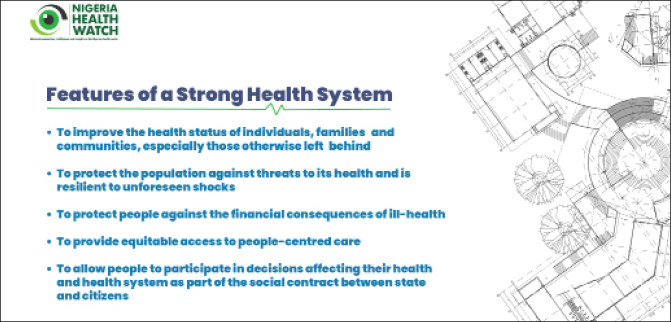Our health system is not working… Nigeria’s health system is very bad…
These comments, often heard as Nigerians recount tales of poor health service bring up several questions. What is a health system and how exactly is it strengthened? Who is responsible for strengthening? What is the impact of weak health systems?
Health Systems Strengthening is a term commonly used when technocrats are referring to complex ideologies that could possibly improve the health of Nigerians. While an important concept and critical to achieving universal health coverage in Nigeria and globally, it is not often clear what it means, how to achieve it, as well as what the responsibility of various stakeholders are, including the regular Nigerian outside the technical health space, to strengthen our health systems.
It is critical to establish first that a health system has very little to do with a single entity and more to do with a broad category of organisations, people, and actions whose main aim is to improve health. This includes all efforts to influence broader factors that determine health such as water and sanitation, education, and human rights.
According to the World Health Organisation, health care systems refer to all the institutions, people and resources involved in delivering health care to individuals. They also refer to the diverse range of stakeholders involved in the provision and financing of health services. Since over 70% of health expenditure is from out-of-pocket payments in Nigeria, this means that major players in the Nigerian health system includes the private, public, formal, and informal sectors who are all involved in funding or implementing health activities.
Health systems are thus typically quite broad with diverse stakeholders across all fields contributing to its outcomes. A functioning health system requires positive action from individual health seeking behaviour to corporate governance and finance structures for health to national institutions that support the thriving of health at all these levels.
Good health depends on determinants outside the health sector, especially as in Nigeria, health outcomes are hampered by underperformance in education (low literacy rates), agriculture (with reference to nutrition), infrastructure (inadequate water, sanitation, and power supply for households and health care facilities), and the environment (air pollution). No sector remains unaffected in the discourse about health which means that responsibilities for health systems strengthening at national, state, and local government level transcends beyond the health sector.
Although many Nigerians agree that our health system is less than ideal across all indicators, most do not know what an effective health system looks like. Having this knowledge will serve as a goalpost and lighthouse of sorts as complex stakeholders work to strengthen the Nigerian health system.
An effective health system ultimately improves the health of its populace, protects against threats to their health, while shielding citizens from the financial impact of ill-health. In an ideal health system, all citizens have equitable access to quality health care, and are able to participate in decisions regarding the health system.
Ultimately, a strong health system is one that engages its populace with enough of the right information that they are able to make informed decisions about their health.
One of the reasons why partnerships are vital to strengthening health systems is that many perspectives need to come together for impactful and lasting systemic change. As Dr Mary-Ann Etiebet, lead, MSD for mothers reflects regarding maternal care, “When we support the coming together of contributions of the local private sector – from care providers, innovators, and entrepreneurs – into health systems, we can help women have greater access to sustainable solutions for high-quality, affordable, respectful care wherever they seek care”.
Summarily, issues relating to health systems are vast and the world is too interconnected to ignore the game changing power of partnerships to strengthen our health systems and solve our most complex national issues. To meet the Sustainable Development Goals in 2030, it is more important than ever that new ways to collaborate across previously untapped sectors such as finance, creative arts, new media, entertainment be harnessed to solve problems and create solutions that address health care gaps in Nigeria.
Dara Ajala-Damisa is a Programme Manager at Nigeria Health Watch.

 Join Daily Trust WhatsApp Community For Quick Access To News and Happenings Around You.
Join Daily Trust WhatsApp Community For Quick Access To News and Happenings Around You.


